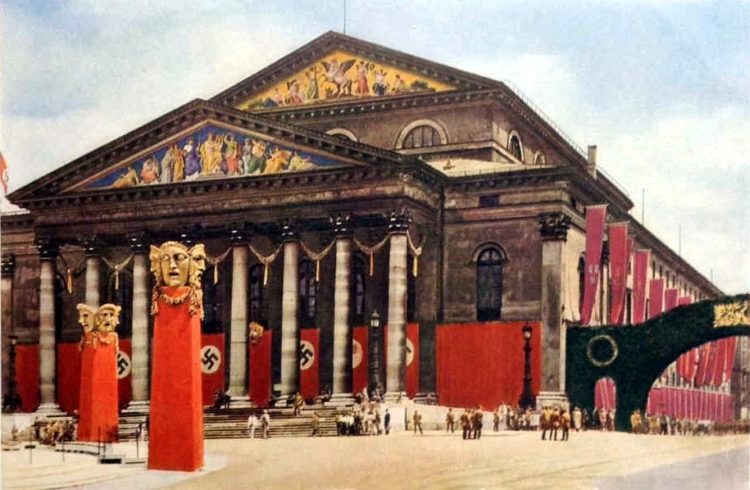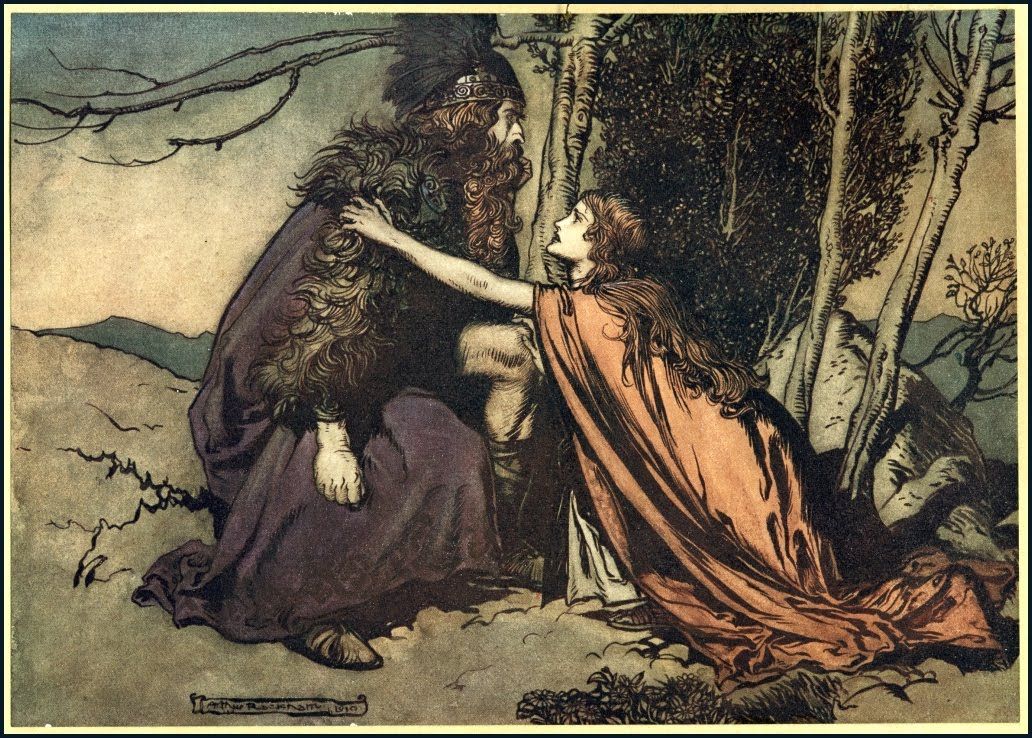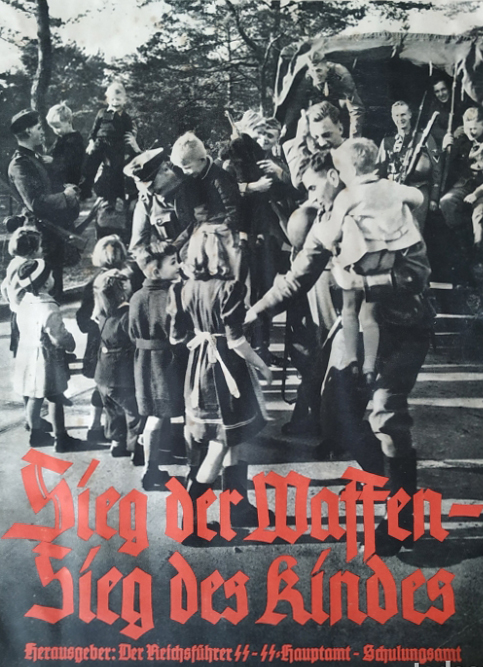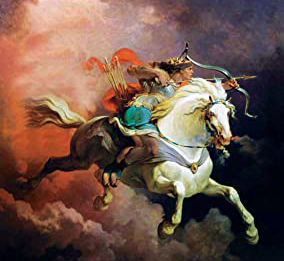Maybe you could admit it, if it was about a politician. But the Leader of National Socialist Germany was something else entirely. He represented, as I have said, the most recent of the visible and tangible manifestations of Him who periodically returns to lead the struggle ‘against Time’ which has been going on, intensifying, since the end of the unthinkable Golden Age, far, far behind us, and which, at the same time, announces the next Golden Age: the blessed beginning of the next cycle.
______ 卐 ______
Editor’s note: It seems to me that here I’ll differ with Savitri (I don’t think the Golden Age existed), but for the moment I won’t enter into the discussion because I haven’t yet read The Lightning and the Sun. I’ve ordered a hard-cover copy from Counter-Currents Publishing since last month, but for some reason I haven’t received it yet. Only when I read The Lightning and the Sun, considered Savitri’s magnum opus, will I know whether I will disagree with her on this point. In the meantime, let’s stick with the book she wrote in French:
______ 卐 ______
Any action he may have taken in the direction of Time can only be fully explained in the light of his mission against Time, of his desperate effort at recovery accomplished in the present conditions of the world, that is, very close relatively speaking to the end of the present cycle. It is the action of an initiate, and therefore of a visionary (not in the sense of a victim of hallucinations but in the sense of a man capable of considering time, including the time in which he lived and the people who lived with him from the point of view of the eternal present); the action of a prophet, a realist as all true prophets are.
He saw very clearly, and it was not necessary to be an initiate or a prophet, the growing interest of the masses in the material pleasures of life, and the absurdity of any effort to distract them from it. He understood that in an age increasingly dominated by technology it cannot be otherwise. More than that, he understood that, deep down, it had never been otherwise; that only the nature of the ‘material amenities’ could change, not the tendency of the majority of people to give them enormous importance—and this for the simple reason that the masses are the masses, everywhere and always. He knew that while human races are unequally gifted, so are men within the same race, or even the same people; that, in particular, alongside the German elite which all his efforts tended to promote, there was—and always would be, even after the installation of the National Socialist ‘new order’—the masses.
In an interview reported by Hermann Rauschning (a man who has become the enemy of the Hitler faith to the very extent that he has begun to grasp at least some aspects of it and whom, therefore, we must believe whenever the words he quotes are really in the mind of the person who is supposed to have uttered them) the Führer sets forth, as early as the summer of 1932, his conception of the German social order as it must, in his eyes, emerge from the revolution he is leading. ‘There will be’, he said, ‘a class of lords from the most diverse elements, which will be recruited in the struggle and will thus find its historical justification. There will be a crowd of the various members of the Party, ranked hierarchically. It is they who will form the new middle classes. There will also be the great mass of the anonymous, the collectivity of servants, the miners ad aeternum. It doesn’t matter whether they were farm owners, workers or labourers in the former bourgeois society. The economic position and social role of the past will no longer have the slightest significance.[1]
There was, therefore, and there must have been for him, even within the good and brave German people he loved, a mass that was irreducibly ‘minor’: a sympathetic mass, to be sure, because of the good Aryan race despite its naivety from which exceptional individuals could sometimes emerge and stand out; but, on the whole, a mass nonetheless with all the mediocrity that this word suggests. It was to them that the Führer offered an increasingly standardised life, full of amenities within their reach, material amenities above all, it goes without saying: the cheap house (which could be dismantled and reassembled) whose parts, the same everywhere, would be easy to find; the radio, the typewriter, and other cheap conveniences.
One only has to remember how much of an artist he was to the core, and in particular how much he had an innate sense of everything that ‘looked good’, to imagine the secret contempt he must have felt for any uniformity from below: a pitiful caricature of unity, the principle of creative synthesis.
One only has to think of his lifestyle—his legendary frugality, in the most beautiful surroundings possible; the fact that in Vienna, for example, during the years of misery that were to mark him so deeply, he went without food to afford a place in the ‘henhouse’ and to hear and see some of Wagner’s opera—to measure the gulf that separated him from all vulgar humanity, and especially from a certain fat type of Teutonic plebeian, whose conception of happiness is schematically, but forcefully and aptly, evoked in the title of a record emanating from the satiated Germany of 1969, Sauerkraut und Bier. This type didn’t wait for 1969 to appear but was widely represented among the crowds who, between 1920 and 1945, cheered Adolf Hitler, voted for him and, especially after the seizure of power, flocked to the Party and helped to increase its membership to fourteen million.
This abyss between the Führer and the densest folk, physically and intellectually, or the most mediocre of his people didn’t prevent him from loving them. He saw, beyond their narrow-minded individuality, the beautiful children who could spring from them, blood having many mysteries. And he saw the Reich, which he was reshaping from top to bottom to make it the centre of a pan-Aryan Empire, and he knew that ‘in their place’ they were part of it.
And if, understanding their limitations and the impossibility of making them overcome them, he offered them each a comfortable material life, ‘pleasant’ in its growing uniformity—a life which he didn’t offer at all to the elite—he also offered them, in the increasingly grandiose public ceremonies, the interminable parades, the music of battle songs through the paved streets, the nightly processions by the light of real torches; the Harvest festivals; the Labour festivals; the Youth festivals; the magnificent annual Party meetings in Nuremberg for days on end with countless red flags with black swastikas on a white circle at the foot of giant pylons at the top of which the flame from the massive bronze cups, the morning to evening in the bright sunshine, and from evening to midnight under the unreal phosphorescence of the columns of light faltering from the floodlights all around.
He offered them, I say, in all this, as well as in his radio speeches, and above all in the magnetism of his presence: an atmosphere such as no people had yet had the privilege of experiencing. The less intuitive, the less artistic, the densest people were subjected to this magical atmosphere which lifted them despite of themselves, above themselves; which transformed them little by little, without their knowledge, by the mere fact of the almost daily intoxication which it poured upon them: the intoxication of beauty; vertigo of strength; repeated contact with the very egregore of Germany which possessed them, pulling them out of their insignificance and returning them for a moment to what was eternal in them, the bewitching rhythm of the ‘Sieg! Heil!’ from five hundred thousand chests.
They were under this spell, and as long as they remained ‘under the spell’ they were great—greater than all peoples; greater than the men, Germans or foreign visitors, who, individually more refined, more intelligent, better than each of them, remained, for some reason or other insensitive to this spell in the strongest sense of the word. For they participated in the divine power which emanated from Him who called them to battle against the sinister Forces of decadence. They were encompassed in the beauty of His dream. And it is enough to remember the imposing solemnities of the Third Reich, if one has seen any, or to read a description of them in person (for example, Robert Brasillach’s description of the Party Congress in Nuremberg in September 1935 in his novel The Seven Colours), or just to look at good photographs of them in the few surviving albums of the period, to realise how beautiful they were—beautiful and popular—and how different they were from the official celebrations, even with military parades, of other countries under other regimes.
Unlike the organised displays of collective patriotic fervour that the governments of the ‘free world’ periodically (though increasingly rarely) regale their citizens with, there were no weary faces, no dull faces, no signs of reluctant participation or boredom. And, unlike the parallel collective demonstrations of the communist world there was nothing vulgar about them. There were no monstrous, oversized daguerrotypes of the dictator, or some ‘people’s father’ ideologue, living or dead, posted on the surrounding buildings or marching with the political, military and paramilitary formations, brandished high above their ranks; none of these heterogeneous bands daubed with demagogic slogans; nothing, I repeat, absolutely nothing of the pasteboard paraphernalia of the delirious proletarian.
There is more. These extraordinary solemnities of National Socialist Germany were beautiful in the sense that works of art of cosmic significance are beautiful. Not only was there a profusion of the immemorial swastika on the folds of the red, white and black banners (themselves symbolic colours), on the immense banners, on the men’s armbands, on the granite of the stands from the top of which the Führer was communing with his people.
It was a metaphysical symbol and not a mere image recalling such and such human activities, or ideas to the measure of man; but the gestures that were performed there, the words that were repeated there, unchanging on every occasion: symbolic, liturgical. Let us think, among other things, of the consecration of the new flags that Adolf Hitler put, one by one, in contact with the old ‘Blood Standard’: all charged with the magnetism of the dead of November 9, or of the ritual dialogue of the Führer with the leaders and young recruits of the peasant formations of the Arbeitsdienst, standing in perfect order before him, armed with their shovels like soldiers with their rifles: ‘Are you ready to fertilize the holy German land?’ – ‘Yes; we are ready’.
These solemnities were themselves symbolic: gigantic sacred dramas, mysteries where the attitude, the word, the creative rhythm and the silence in which the hundreds of thousands communed with the Centre of their collective being evoked: the hidden meaning, the eternal meaning of the New Order.
Only He who returns from age to age could, amid the reign of excessive technology—and mind-numbing standardisation—delight the working masses, and make them participate in such mysteries; transfigure them, infuse them if only for a few brief years—even the densest human specimens among them!—the enthusiasm of the regenerate.
___________
[1] H. Rauschning, Hitler Told Me translated from the German by A. Lehmanu 13th edition, Paris 1939, page 61.








